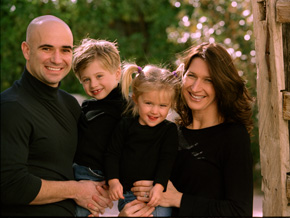Advantage, Agassi

Photo: John Russell/TeamRussell
In his powerful autobiography, Open, tennis legend Andre Agassi shows us that the language of tennis is much akin to the language of life—advantage, service, fault, love. With unflinching honesty, Agassi reveals that his seemingly charmed life as a tennis giant was one he deeply hated. He talks to Oprah.com about looking back at his journey, facing his demons and finding empowerment and love through family, philanthropy and even tennis.
Jenn Horton: Tell me a little bit about why you wanted to do the autobiography now and how that choice came to be. Why now? Why at all?Andre Agassi: I've lived a public life, and I feel like things were said about me, things I said about myself, both good and bad, that were just not accurate. You can't communicate yourself when you don't know yourself. I spent a lot of my life not knowing myself as a result of the whirlwind that I lived. So when I retired and I started this sort of new life, I really wanted to understand my story. I think if we all looked at ourselves, we would find a lot of contradictions that ultimately haven't been reconciled. I wanted to understand that narrative. In looking at it, I believed there was real power in it. I really believe that my story will impact so many people I'll never meet and give them the tools to take ownership of their life—the tools to figure out how to avoid or get through some of the pitfalls I've been through. I think there are millions of people in marriages they don't want to be in and millions of people that hate what they do [Andre was married to actress Brooke Shields from 1997 to 1999]. I think that if they found inspiration from me going from the number 141 [tennis ranking] in the world to number one and really knew my story, it would be that much more inspirational.
JH: How did you prepare yourself to be okay with putting it all out there? Were you worried about anyone's reaction?
AA: I worry about reaction, but I'm more interested in people's response. It took me a long time to process my life; I don't expect anyone else to do it through headlines. Ultimately, I think calmer heads rule the day, and people will read my book in the context of the body of work that it is—which is my life. Assuming I've done this book the way I hoped to do it, I think this will live a lot longer than me. I think if the downside is a few [negative] reactions, that is a price I'm willing to pay.
Agassi's struggle with a life he didn't choose



